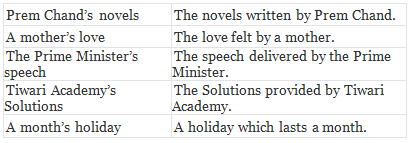The Noun: Case | English Grammar for Class 6 PDF Download
The Noun: Subjective Case
When a Noun or Pronoun is used as a Subject of a Verb, it is said to be in the Nominative or Subjective Case.
For example:
- Akshay was a good boy.
- The cow is a useful animal.
- She lights a lamp.
- The stone fell from above.
In the above sentences, the words Akshay, The cow, She, The stone are the subjects of the verbs was, is, lights, and fell respectively. They are said to be in the Nominative or The Nominative Case in a sentence can be found by asking the question Who? Which? or What? to the verb. Who was a good boy? – Akshay. Which is a useful animal? – The Cow. Who lights a lamp? – She. What fell? – The stone. Hence Ram, She, The cow, The stone are in the (Nominative or Subjective Case)
The Noun: Objective Case
A Noun or Pronoun that is the Object of a Verb is in the Objective Case.
- Rohit bought a watch.
- Aman hated Mohit.
In the above sentences a watch and Yogesh are the objects of the verbs bought and hated respectively they are said to be in the Objective Case or Accusative Case. Objective Case can be found out by putting the question Whom? or What? after the Verb.
What did Rohit buy? – A watch
Whom did Aman hate? – Mohit
Hence a watch and Mohit are in the Objective Case or Accusative Case.
Ram and Yogesh can reverse or exchange their cases when the same sentence is written in the Passive Voice, e.g. Yogesh was hated by Ram. Here Yogesh and Ram are in the Nominative and Accusative Case respectively.
Direct and Indirect Object
Some verbs like—teach, tell, give, ask, offer, promise take two objects after them. One of these objects refers to some person (living); the other refers to some thing (non-living).
- The teacher taught us English.
- Mother gave the beggar a rupee.
In sentence 1, us and English are both objects of the verb taught. ‘Us’ is the Indirect Object and ‘English’ the Direct Object. In sentence 2, the beggar and a rupee are both objects of the verb gave. Beggar is the Indirect Object and rupee the Direct Object.
The Noun: Dative Case
A Noun is said to be in the Dative Case, when it is the Indirect Object; as, (i) Vikrant gave Khushi a book. (ii) The teacher asked Harshit a question. The Direct object is the first sentence is book and in the second sentence it is question. While the Indirect Object in the first sentence is Khushi, in the second it is Harshit. Hence they are in the Dative Case. The position of the Dative Case (Indirect Object) is immediately after the verb or after the Direct Object following a Preposition.
The Noun: Vocative Case
If a Noun is used to name a person or thing addressed, it is said to be in the Vocative Case.
Come here, boys. Naresh, listen to me. In the above sentences, boys and Naresh are the names of the persons spoken to or addressed. They are, therefore, said to be in the Vocative Case. The Vocative Case is also called the Nominative of Address.
The Noun: Possessive Case
A noun in the Possessive Case is the possessor of the thing. He is Mohan’s father. This is Sita’s book. To find the possessive case put the question—whose? Whose father? – Mohan Whose book? – Sita. The Possessive Case does not always denote possession. It is used to denote authorship, origin, kind etc.

Formation of the Possessive
The letter s is omitted in a few words where too many hissing sounds would come together; as, for conscience’ sake, for goodness’ sake, for justice’ sake, for Jesus’ sake, the Moses’ laws.
- When the noun is plural, and ends in s, the Possessive Case is formed by adding only an apostrophe.
- When the noun in Plural does not end in s, the Possessive sign is formed by adding s.
- When a noun or a title consists of several words, the possessive sign is attached only to the last word.
- When two nouns in apposition, the possessive sign is put to the latter only.
- Also when two nouns are closely connected, the possessive is put to the latter.
- Each of two or more connected nouns implying separate prossessions must take the possessive sign.
|
49 videos|349 docs|46 tests
|
FAQs on The Noun: Case - English Grammar for Class 6
| 1. What is a noun and how is it classified in English grammar? |  |
| 2. Can you explain what Case Class 6 refers to in the context of nouns? |  |
| 3. How do nouns function in sentences? |  |
| 4. What are some examples of different types of nouns in Case Class 6? |  |
| 5. How can one improve their understanding and usage of nouns in writing? |  |

















